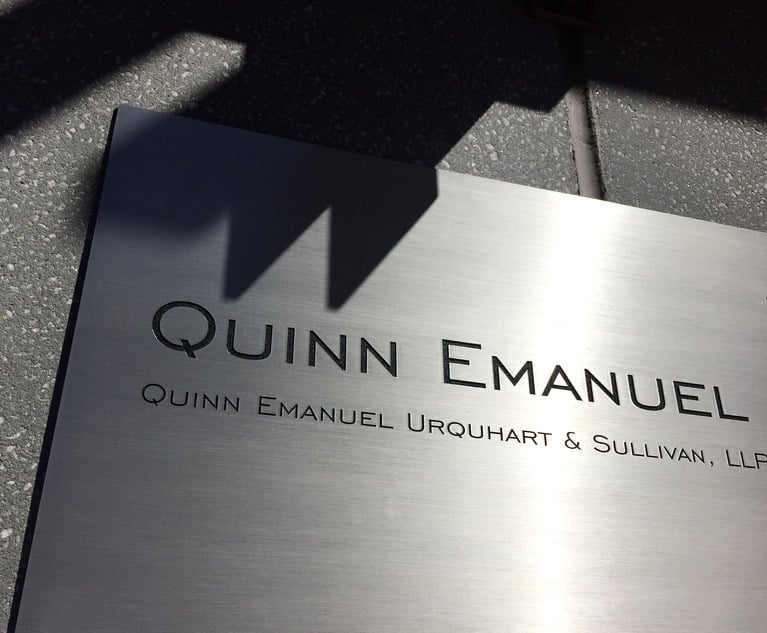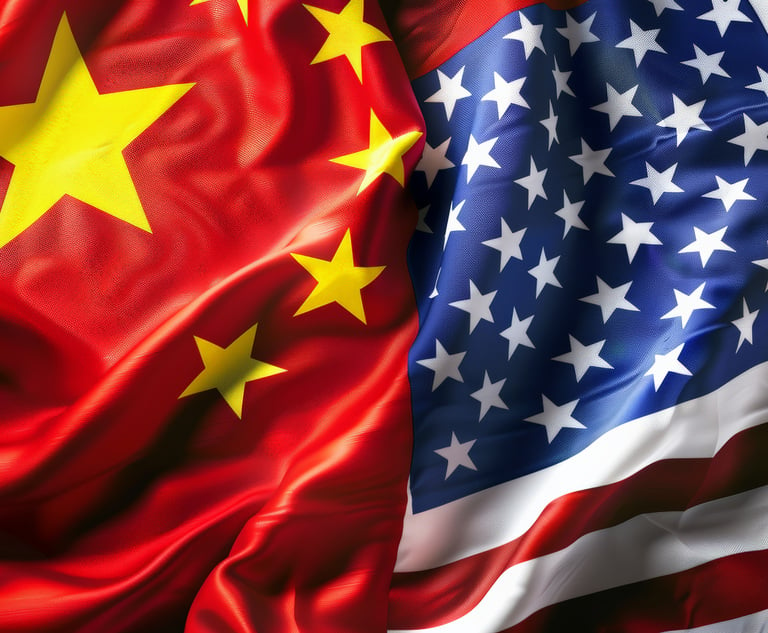Hill Dickinson and Norton Rose Fulbright partners aboard UK-US trade talks
Hill Dicks shipping chief leads trade delegation to New York for talks over post-Brexit deal
November 02, 2018 at 07:23 AM
2 minute read
Hill Dickinson has taken a lead role on trade talks between the US and UK, as the two countries lay the groundwork for a potential post-Brexit trade deal.
The firm's global shipping head Julian Clark led a maritime trade delegation – including secretary of state for international trade Liam Fox – which travelled to New York this month to discuss post-Brexit trade arrangements with its US counterparts.
The inaugural Maritime Nations Forum took place on the HMS Queen Elizabeth (pictured), currently docked in New York, after the US recently announced its intention to negotiate a new trade deal with the UK as it prepares to leave the European Union next year.
On the US side, Norton Rose Fulbright US transport head Brian Devine was among the delegation, along with Keith Heard, a senior maritime lawyer at New York firm Lennon Murphy & Phillips.
Clark told Legal Week: "Over my 30 years of practice I've never seen this kind of synergy between the entire UK maritime sector. There's a real feeling of opportunity, and a real buzz."
Clark chaired sessions on various topics during the summit, including the potential synergies between maritime clusters, fintech, cybersecurity and blockchain.
"Although we can't enter formal negotiations until after March, the forum was about laying down foundations and creating synergies between our two countries, and finding further ways to co-operate and develop our existing cross-border relationships," he added.
Clark joined Hill Dickinson in January 2017 after more than six years at Campbell Johnston Clark, the shipping specialist firm he co-founded in 2010 with two other ex-HFW partners.
He added that he remains confident there will be a deal in place when the UK leaves the EU, but that Hill Dickinson was "prepared for a no-deal, if necessary".
Earlier this year, research by the Law Society revealed a 'no-deal' Brexit could lose 12,000 jobs and £3bn in turnover for the UK legal sector. Uncertainty over a deal has also prompted some international firms to look to open offices in Ireland as an "insurance policy".
This content has been archived. It is available through our partners, LexisNexis® and Bloomberg Law.
To view this content, please continue to their sites.
Not a Lexis Subscriber?
Subscribe Now
Not a Bloomberg Law Subscriber?
Subscribe Now
NOT FOR REPRINT
© 2025 ALM Global, LLC, All Rights Reserved. Request academic re-use from www.copyright.com. All other uses, submit a request to [email protected]. For more information visit Asset & Logo Licensing.
You Might Like
View All
X Ordered to Release Data by German Court Amid Election Interference Concerns

Quinn Emanuel's Hamburg Managing Partner and Four-Lawyer Team Jump to Willkie Farr

Trump ICC Sanctions Condemned as ‘Brazen Attack’ on International Law

U.S.- China Trade War: Lawyers Label WTO Dispute Pointless, Clients Have Their Hands Tied
Trending Stories
- 1States Accuse Trump of Thwarting Court's Funding Restoration Order
- 2Microsoft Becomes Latest Tech Company to Face Claims of Stealing Marketing Commissions From Influencers
- 3Coral Gables Attorney Busted for Stalking Lawyer
- 4Trump's DOJ Delays Releasing Jan. 6 FBI Agents List Under Consent Order
- 5Securities Report Says That 2024 Settlements Passed a Total of $5.2B
Who Got The Work
J. Brugh Lower of Gibbons has entered an appearance for industrial equipment supplier Devco Corporation in a pending trademark infringement lawsuit. The suit, accusing the defendant of selling knock-off Graco products, was filed Dec. 18 in New Jersey District Court by Rivkin Radler on behalf of Graco Inc. and Graco Minnesota. The case, assigned to U.S. District Judge Zahid N. Quraishi, is 3:24-cv-11294, Graco Inc. et al v. Devco Corporation.
Who Got The Work
Rebecca Maller-Stein and Kent A. Yalowitz of Arnold & Porter Kaye Scholer have entered their appearances for Hanaco Venture Capital and its executives, Lior Prosor and David Frankel, in a pending securities lawsuit. The action, filed on Dec. 24 in New York Southern District Court by Zell, Aron & Co. on behalf of Goldeneye Advisors, accuses the defendants of negligently and fraudulently managing the plaintiff's $1 million investment. The case, assigned to U.S. District Judge Vernon S. Broderick, is 1:24-cv-09918, Goldeneye Advisors, LLC v. Hanaco Venture Capital, Ltd. et al.
Who Got The Work
Attorneys from A&O Shearman has stepped in as defense counsel for Toronto-Dominion Bank and other defendants in a pending securities class action. The suit, filed Dec. 11 in New York Southern District Court by Bleichmar Fonti & Auld, accuses the defendants of concealing the bank's 'pervasive' deficiencies in regards to its compliance with the Bank Secrecy Act and the quality of its anti-money laundering controls. The case, assigned to U.S. District Judge Arun Subramanian, is 1:24-cv-09445, Gonzalez v. The Toronto-Dominion Bank et al.
Who Got The Work
Crown Castle International, a Pennsylvania company providing shared communications infrastructure, has turned to Luke D. Wolf of Gordon Rees Scully Mansukhani to fend off a pending breach-of-contract lawsuit. The court action, filed Nov. 25 in Michigan Eastern District Court by Hooper Hathaway PC on behalf of The Town Residences LLC, accuses Crown Castle of failing to transfer approximately $30,000 in utility payments from T-Mobile in breach of a roof-top lease and assignment agreement. The case, assigned to U.S. District Judge Susan K. Declercq, is 2:24-cv-13131, The Town Residences LLC v. T-Mobile US, Inc. et al.
Who Got The Work
Wilfred P. Coronato and Daniel M. Schwartz of McCarter & English have stepped in as defense counsel to Electrolux Home Products Inc. in a pending product liability lawsuit. The court action, filed Nov. 26 in New York Eastern District Court by Poulos Lopiccolo PC and Nagel Rice LLP on behalf of David Stern, alleges that the defendant's refrigerators’ drawers and shelving repeatedly break and fall apart within months after purchase. The case, assigned to U.S. District Judge Joan M. Azrack, is 2:24-cv-08204, Stern v. Electrolux Home Products, Inc.
Featured Firms
Law Offices of Gary Martin Hays & Associates, P.C.
(470) 294-1674
Law Offices of Mark E. Salomone
(857) 444-6468
Smith & Hassler
(713) 739-1250









